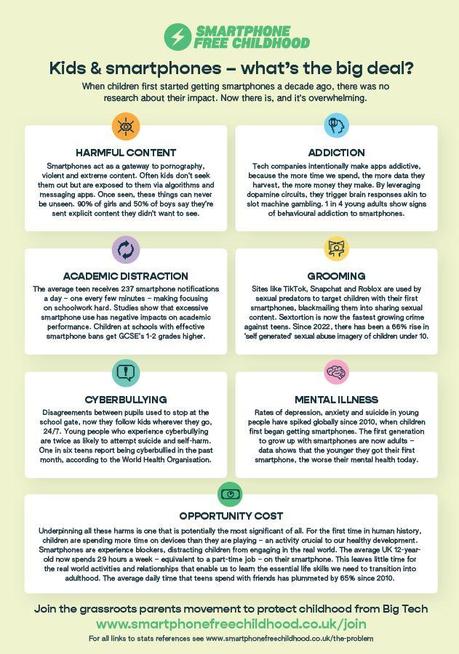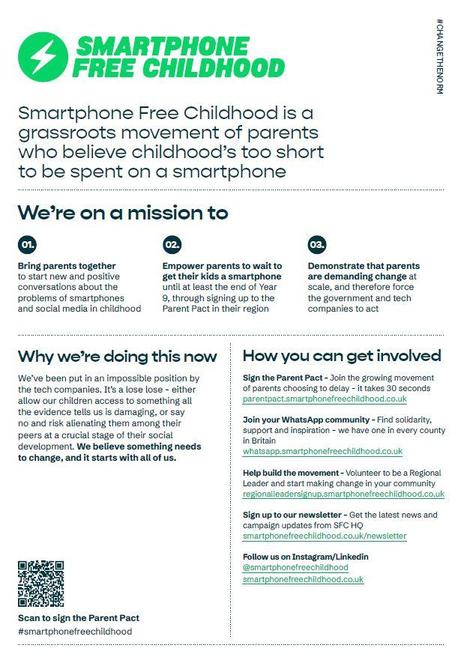Smartphone free childhood
"You can't go back and change the beginning, but you can start where you are and change the ending"
C.S. Lewis
The Problem
When smartphones were first introduced to children, we were unaware of their potential impact. Now, a growing body of evidence links smartphone use to various harms, including anxiety, depression, and loneliness. Smartphones can expose children to pornography, cyberbullying, grooming, and violent or extreme content. Research indicates that smartphones can negatively affect academic performance, and many children exhibit signs of behavioural addiction to their devices.
One of the most sig nificant issues is that smartphones act as experience blockers, distracting children from engaging with the real world. The average UK 12-year-old now spends 29 hours a week – equivalent to a part-time job – on their smartphone. This leaves little time for real-world activities and relationships that are crucial for developing essential life skills needed for the transition to adulthood. Research shows that the younger a child receives their first smartphone, the worse their mental health tends to be.
nificant issues is that smartphones act as experience blockers, distracting children from engaging with the real world. The average UK 12-year-old now spends 29 hours a week – equivalent to a part-time job – on their smartphone. This leaves little time for real-world activities and relationships that are crucial for developing essential life skills needed for the transition to adulthood. Research shows that the younger a child receives their first smartphone, the worse their mental health tends to be.
Despite this, the age at which children receive their first smartphone is decreasing. In the UK, a fifth of 3-4 year-olds and 24% of 5-7 year-olds own their own devices. Many parents feel pressured to give their child a smartphone to avoid isolating them from their peers. While better regulation of Big Tech is needed, enacting legislation takes years – time that we, as parents of children today, do not have. In the meantime, our most powerful defence lies in banding together and taking collective action.
We are proud to be a phone-free school, where children are not allowed to bring phones into school until they reach Years 5 and 6, and only then if they are walking home alone. This policy is an important step in preparing them for secondary school. Phones brought to school are handed in to an adult and returned at the end of the day. Additionally, phones are not permitted on school trips or residential visits.
What we’re asking of you:
- Simple Phones only. We ask that parents consider purchasing simple phones for their children if they will be walking home alone in Year 5/6. A list of simple phones can be found here: https://smartphonefreechildhood.co.uk/alternatives
- Sign the Pact. By signing this Pact, you join a fast-growing community of families across the UK who are choosing to wait to give their child a smartphone, until at least the end of Year 9. It takes 30 seconds to sign the Parent Pact, and the more who do, the quicker we'll change the social norm. https://parentpact.smartphonefreechildhood.co.uk/
A Stolen Childhood (Main film)
Watch time:11:24 minutes 9 in 10 children are given a smartphone by the age of eleven. How is unlimited internet and/or social media access affecting our children's sense of well-being? Current research suggests that the messages they receive during these formative years can shape our children's beliefs about themselves and the world around them - sometimes adversely affecting their mental health.
How can parents contact and keep track of children when they’re out on their own if they don’t have a smartphone?
There are various ways to do this other than using smartphones. The Delay Smartphones website talks about some of the alternatives, including smartwatches and simple phones.
What will happen once children reach secondary school /will most of their friends have smartphones?
This is why signing the pledge is so important!
By signing the pledge, parents are helping each other to know that their child will not be the only one without a smartphone.
You can click here to sign the pledge - it only takes a minute!
My child already has a smartphone / is getting one soon.
Every family will do what they believe is the right thing for their child. The pledge is intended to help those who would prefer to wait to realise they are not alone in their decision - there is no expectation that every parent will feel this way. It is about giving parents a choice about whether to get their child a smartphone or whether to wait, rather than trying to remove that choice from those who do want to get their child a smartphone at an earlier age.
For parents of children who use the internet on any device, the Internet Matters website is a good source of tips and advice about keeping as safe as possible.
Our Parent Pact
These suggestions are to help support you and your children in managing mobile phone use, knowing that other parents in the school are doing the same.
Their suggestions are:
- Phones to and from school only to be used for essential contact- the focus should be on the road and surroundings and not the screen.
- Think before you message- if you wouldn't say it to someone's face, don't say it in a message.
- It is ok to leave a group or chat in which you do not feel happy.
- Children must talk to their parents/carers or teachers about concerns.
- The cut-off time for phone use is 8 pm. Phones are to be given to an adult to be put away; no phones in the bedroom overnight.
- Social media/communication apps are limited to match the child's age to the age restrictions
- Age-appropriate gaming.
- No participation in whole class group chats or all boys/all girls chats.
- All pictures- make sure you are fully clothed.
- No phones in the bedroom, phones to be used in family communal areas.
- No phones during meals.
We hope the above suggestions help parents manage their child's phone use. If you are concerned about your child's well-being and mental health, please speak to your child's teacher.
